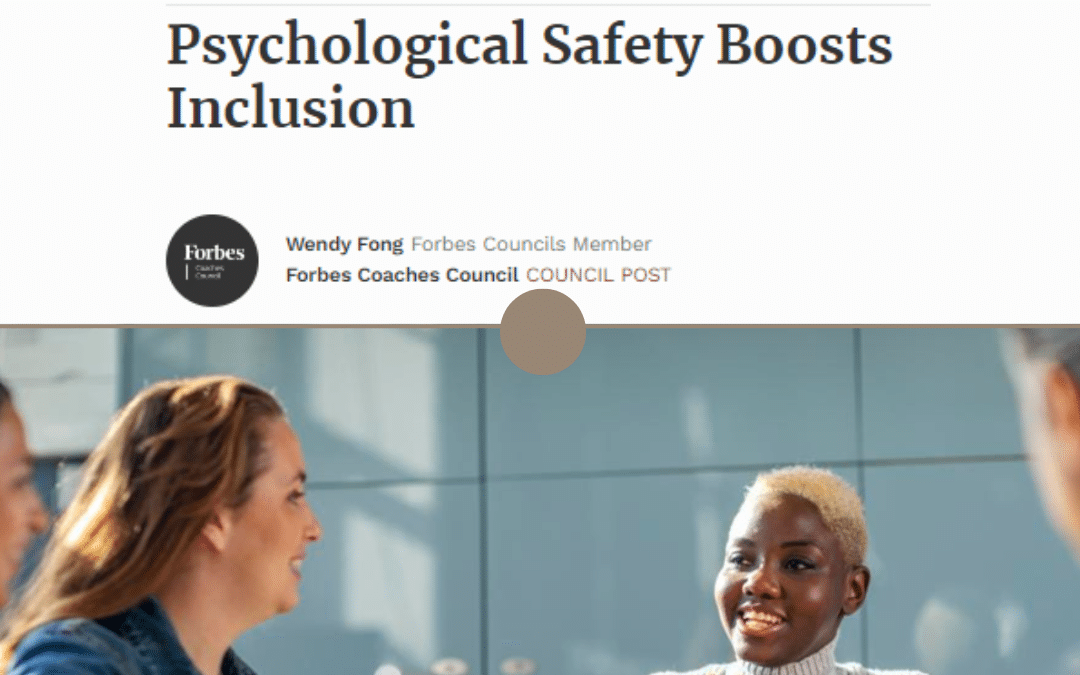This article originally appeared on the Forbes | Coaches Council website! Check out our Forbes page for more articles like this one.
In inclusive environments, leaders trust that policies are in place to stimulate working conditions where employees feel physically and emotionally safe. No matter how safe and inclusive your business is, leaders can still experience limited feedback or input from employees. This article aims to highlight this form of safety that is often overlooked and cannot be understated.
What is psychological safety?
Psychological safety is the belief that you will not be reprimanded, humiliated, or penalized for voicing your individual concepts and ideas, concerns, questions, or errors. It takes a considerable amount of risk-taking behavior to voice concerns or feedback regarding another employee or a supervisor in any capacity. Psychological safety is present when employees can speak their minds with minimal fear that doing so will cause repercussions.

Psychological safety cannot be ‘created.’
It would be amazing to simply tell your employees that they can come to you with feedback, but that does not mean you have eased their minds on coming to you with their concerns. Psychologically, people interpret speaking their minds as a social risk. It sets an employee up to have a point of contention and leads them into a potential conflict with someone else. It also contradicts their natural need to get along with others. With these behaviors in mind, you can imagine the barriers one must break through to overcome this thought process.
Hospitable workplaces are risky.
If you have overarching issues within your business but no one has come forward, you may be experiencing “false harmony”; an overemphasis on kindness and hospitality could be dissuading and discouraging any developing psychological safety. With an employee’s desire to remain civil with their coworkers and/or supervisors, your work environment can operate within a bubble. Thus, you keep the striking reality of integral business or operating issues on the back burner. As you examine psychological safety as it pertains to your business, here are some scenarios to consider.

Give (and take) credit where it’s due.
Where do you draw the line at which success is an individual or a group effort? Whether it’s done consciously or not, leaders may overlook highlighting their employees’ contributions. Leaders who take credit for the success of their team can also be quick to criticize and avoid taking responsibility for failures. They might instead prefer to blame individuals on their team or the collective for mistakes, despite taking full ownership of the success.
The “logic” of it implies, “If management looks good, my team looks good by association,” or “It doesn’t matter who gets credit if we’re all successful.” Neither of those statements is true. The work does not speak for itself; giving credit is exceedingly important.

Among managers across business models, managers who give credit where it is due “attract more top performers to their teams.” They gain a reputation among their superiors and peers and a better reputation than someone who takes credit for their team’s brilliant ideas for themselves. There is a great quote from Psychological Safety UK that says, “A good leader takes less than their fair share of the credit and more than their fair share of the blame.”
In a psychologically safe environment, members of your team have to know their work is seen and matters. In this situation, if employees are unsure if they receive credit for their hard work and successes, and they are likely to be blamed or reprimanded for any shortcomings, their professional performance can deteriorate. Your culture’s psychological safety will diminish along with it.
It is hurtful when someone shares and takes credit for your ideas. While this is a common occurrence that employees experience, they do not often voice their concerns to supervisors. As daunting and exceedingly difficult as it is to advocate for yourself, addressing these concerns with a management team is the key to creating the transparency the organization desires.
Body language matters.
Negative body language and responses are a surefire way to decrease your psychological safety. You may not think this applies to you, but your body language responds to your team before your words do. This is true whether it’s in person or virtual. As a leader, recognize your natural reactions to things as a high point in your reactional capacity. Examine your responses to determine what would be the most effective manner of communicating your concerns with your team.
When receiving less-than-optimal news, we physically embody a negative reaction: crossing our arms, sighing, frowning or making facial expressions. Such reactions can contribute to the faltering of psychological safety. When coworkers share bad news, an overtly negative reaction on your part could prevent them from coming to you with problems or developments in the future. A negative reaction serves to only punish others for keeping you apprised and can drive a wedge between you and your team.
Truthfully, no one wants to get yelled at for simply doing their job of communicating. The same idea goes for brainstorming new concepts or projects. No matter your professional thoughts on the idea, consider recognizing and appreciating individuals’ initiative and the thought that your employee put into sharing this idea with you.
Are you pushing for perfection or micromanagement?
Your pursuit of excellence might set your business back in the psychological safety department. Your team works hard to produce work that the organization can be proud of, but errors can and will happen. It is important to catch these mistakes as soon as possible; however, micromanaging your team or constantly checking in on your team implies a lack of trust. The foundation of any professional relationship and psychological safety is trust. Without autonomy and freedom to complete their work with the knowledge that failure is a part of progress, your organization will lose out on the innovation that psychological safety can bring to a workplace.
Read and research.
Psychological safety is powerful, but it can easily be destroyed. Understand the importance of psychological safety and the detrimental effects it can have on your team if you continue to go without it.
Want more on psychological safety? Read the newest Chief Gigs blog Psychological Safety: Employee Edition by Megan Chavez!

